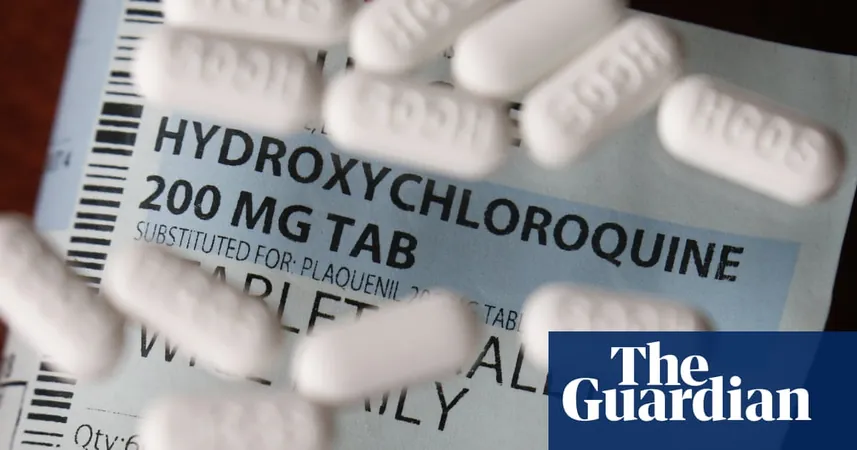
Major Setback: Influential Hydroxychloroquine Study Retracted Amid Ethical Controversies!
2024-12-18
Author: Yan
Retracted Study Overview
In a shocking turn of events, a groundbreaking study that previously heralded hydroxychloroquine—a drug originally used for malaria—as a potential treatment for Covid-19 has been officially retracted. Elsevier, a prominent Dutch academic publishing company that owns the International Journal of Antimicrobial Agents, announced this retraction on Tuesday, citing serious violations of research ethics and questions about the integrity of the study.
Ethical Concerns
This controversial research, published in March 2020, raised alarms in the medical community. Elsevier disclosed that multiple concerns were flagged regarding the study's adherence to ethical research practices involving human subjects. Even more troubling, three of the study's own authors raised serious doubts about its methodology and conclusions, calling into question the reliability of its findings.
Investigation Findings
An extensive investigation by Elsevier’s research integrity and publishing ethics team, along with the International Society of Antimicrobial Chemotherapy—the journal’s co-owner—uncovered significant lapses in the study. Notably, the journal could not verify whether the patients involved had been enrolled before obtaining proper ethical clearance. Moreover, it was unclear whether a genuine equipoise existed—meaning whether there was uncertainty in the medical community regarding the effectiveness of hydroxychloroquine compared to standard treatments.
Informed Consent Issues
The journal also failed to confirm whether informed consent was appropriately obtained from patients regarding the administration of azithromycin, an antibiotic combined with hydroxychloroquine in the study based on the claim that it would enhance Covid treatment effectiveness. The retraction noted that it appeared azithromycin was not considered standard care at the time the study was conducted.
Authors' Response
Since its publication, three of the original authors—Johan Courjon, Valérie Giordanengo, and Stéphane Honoré—have distanced themselves from the research and expressed their desire to remove their names from association with the paper. While some authors support the retraction, a few continue to challenge the grounds on which it was based.
Significance of the Retraction
According to reports from Nature, this study is now the most-cited paper on Covid-19 to have been retracted, and it stands as the second-most-cited retracted paper in history. This staggering impact on public health and policy cannot be understated.
Context of Hydroxychloroquine's Promotion
The backdrop to this retraction is significant: the US Food and Drug Administration (FDA) granted emergency use authorization in March 2020 for hydroxychloroquine, which led to its widespread use among hospitalized Covid-19 patients. At the time, then-President Donald Trump fervently promoted hydroxychloroquine, even claiming to be taking it as a preventive measure.
Emerging Evidence Against Hydroxychloroquine
However, mounting evidence against its efficacy prompted a wave of skepticism. A recent study published in the peer-reviewed journal Biomedicine & Pharmacotherapy found that patients treated with hydroxychloroquine faced an 11% higher risk of mortality from Covid-19.
Professional Condemnation
Following the retraction, the French Society of Pharmacology and Therapeutics issued a striking condemnation, labeling the study a textbook case of scientific misconduct marked by data manipulation and biased interpretation. They emphasized the catastrophic consequences of the study, which contributed to the unnecessary overprescription of hydroxychloroquine to millions. This misstep in the medical community raises grave concerns regarding patient safety.
Conclusion
As the world continues to grapple with the effects of Covid-19 and evaluate potential treatments, this retraction underscores the essential nature of rigorous scientific scrutiny in healthcare. What will be the long-term implications of this retraction on the perception of hydroxychloroquine and the pandemic’s treatment landscape? Only time will tell.


 Brasil (PT)
Brasil (PT)
 Canada (EN)
Canada (EN)
 Chile (ES)
Chile (ES)
 España (ES)
España (ES)
 France (FR)
France (FR)
 Hong Kong (EN)
Hong Kong (EN)
 Italia (IT)
Italia (IT)
 日本 (JA)
日本 (JA)
 Magyarország (HU)
Magyarország (HU)
 Norge (NO)
Norge (NO)
 Polska (PL)
Polska (PL)
 Schweiz (DE)
Schweiz (DE)
 Singapore (EN)
Singapore (EN)
 Sverige (SV)
Sverige (SV)
 Suomi (FI)
Suomi (FI)
 Türkiye (TR)
Türkiye (TR)